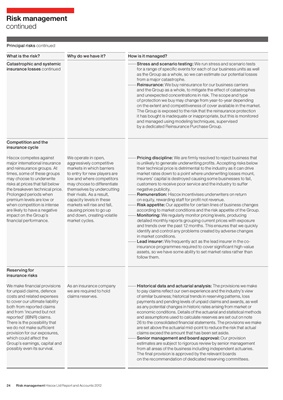
Risk management
continued
Principal risks continued
What is the risk? Why do we have it? How is it managed?
Catastrophic and systemic Stress and scenario testing: We run stress and scenario tests
insurance losses continued for a range of specific events for each of our business units as well
as the Group as a whole, so we can estimate our potential losses
from a major catastrophe.
Reinsurance: We buy reinsurance for our business carriers
and the Group as a whole, to mitigate the effect of catastrophes
and unexpected concentrations in risk. The scope and type
of protection we buy may change from year-to-year depending
on the extent and competitiveness of cover available in the market.
The Group is exposed to the risk that the reinsurance protection
it has bought is inadequate or inappropriate, but this is monitored
and managed using modeling techniques, supervised
by a dedicated Reinsurance Purchase Group.
Competition and the
insurance cycle
Hiscox competes against We operate in open, Pricing discipline: We are firmly resolved to reject business that
major international insurance aggressively competitive is unlikely to generate underwriting profits. Accepting risks below
and reinsurance groups. At markets in which barriers their technical price is detrimental to the industry as it can drive
times, some of these groups to entry for new players are market rates down to a point where underwriting losses mount,
may choose to underwrite low and where competitors insurers’ capital is destroyed causing some businesses to fail,
risks at prices that fall below may choose to differentiate customers to receive poor service and the industry to suffer
the breakeven technical price. themselves by undercutting negative publicity.
Prolonged periods when their rivals. As a result, Remuneration: Hiscox incentivises underwriters on return
premium levels are low or capacity levels in these on equity, rewarding staff for profit not revenue.
when competition is intense markets will rise and fall, Risk appetite: Our appetite for certain lines of business changes
are likely to have a negative causing prices to go up according to market conditions and the risk appetite of the Group.
impact on the Group’s and down, creating volatile Monitoring: We regularly monitor pricing levels, producing
financial performance. market cycles. detailed monthly reports grouping current prices with exposure
and trends over the past 12 months. This ensures that we quickly
identify and control any problems created by adverse changes
in market conditions.
Lead insurer: We frequently act as the lead insurer in the co-
insurance programmes required to cover significant high-value
assets, so we have some ability to set market rates rather than
follow them.
Reserving for
insurance risks
We make financial provisions As an insurance company Historical data and actuarial analysis: The provisions we make
for unpaid claims, defence we are required to hold to pay claims reflect our own experience and the industry’s view
costs and related expenses claims reserves. of similar business; historical trends in reserving patterns, loss
to cover our ultimate liability payments and pending levels of unpaid claims and awards, as well
both from reported claims as any potential changes in historic rates arising from market or
and from ‘incurred but not economic conditions. Details of the actuarial and statistical methods
reported’ (IBNR) claims. and assumptions used to calculate reserves are set out on note
There is the possibility that 26 to the consolidated financial statements. The provisions we make
we do not make sufficient are set above the actuarial mid-point to reduce the risk that actual
provision for our exposures, claims exceed the amount that has been set aside.
which could affect the Senior management and board approval: Our provision
Group’s earnings, capital and estimates are subject to rigorous review by senior management
possibly even its survival. from all areas of the business including independent actuaries.
The final provision is approved by the relevant boards
on the recommendation of dedicated reserving committees.
24 Risk management Hiscox Ltd Report and Accounts 2012